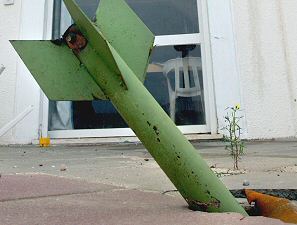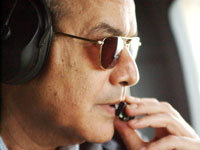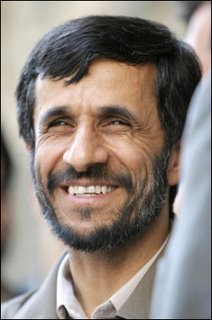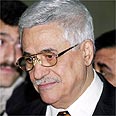Slogan of the month:
Leadership requires daring. Abu Mazen is now facing his Altalena test.
Raphael Cohen-Almagor
This was a month of civilian casualties on both sides. The Palestinians launched dozens of Qassam missiles from the Gaza Strip on Israeli neighbouring towns, bringing us Israelis to rethink whether Gaza First was a prudent idea, and whether it should be made Gaza Last. The Israeli army, in turn, bombarded Gaza with heavy artillery and missiles, causing death by the dozens, most of the casualties being innocent civilians. How much blood is still needed to realize that it is better to speak than to fire, and that we need to split the land between the two people? I wonder.
Apology and Correction, Occupation, Olmert's Convergence Plan, Abu Mazan, Qassams, Center for Democratic Studies, Dan Halutz, Palestinian Media Caught Between Hamas-Fatah Rift, INDEX ON CENSORSHIP Seeks Editor, ELLMAN/HAMMETT Grant Program, Leipzig Prize for the Freedom and Future of the Media, New Articles, World Cup (Mondial), Photos
Apology and Correction
In my May Newsletter I informed you of the Iranian Nuremberg Law. The same day I received a few reactions, saying that that story was, in fact, untrue. After some further investigation I verified that this is, indeed, the case. I am very sorry for this. My sincere apology to all those who might have been offended due to my inaccurate report.
Terrorism & Security
posted May 25, 2006 at 11:30 a.m.
http://www.csmonitor.com/2006/0525/dailyUpdate.html?s=mesdu
Iran color-coded religious badges story 'untrue'
False story's publication in Canadian paper is 'real sign of a disinformation operation.'
By Tom Regan csmonitor.com
The National Post has said that a story it ran that claimed religious minorities in Iran would be forced to wear special color-coded badges is in fact not true.
The Canadian Press reports that the National Post, a conservative newspaper in Canada, announced Wednesday that the story, which stirred memories of the Holocaust, was wrong. [Editor's note: The original National Post story is currently not available on its website.]
The Press also reports that the Iranian government summoned the Canadian ambassador to Tehran Wednesday to deal with the fallout of remarks made by Canadian Prime Minister Stephen Harper that he had based on the National Post story. Mr. Harper had said that such a dress code would remind people of Nazi Germany.
Iranian legislators denied any such provision existed in a bill to encourage Islamic dress. A copy of the draft law obtained by the Associated Press made no mention of religious minorities or any requirement of special attire for them.
"We apologize for the mistake and for the consternation it has caused not just National Post readers, but the broader public who read the story," Douglas Kelly, editor-in-chief of the National Post, wrote in a Page 2 column. Mr. Kelly said the story was based on a column by Amir Taheri, an Iranian author and journalist, and two expatriate Iranians living in Canada. "We should have pushed the sources we did have for more corroboration of the information they were giving us," Mr. Kelly said.
The New York Post also ran the story over the weekend, under the full-page headline "Fourth Reich." The Associated Press reports that the original story created an international uproar.
The United States, which is locked in a standoff with Iran over its nuclear program, criticized the bill. The Simon Wiesenthal Center in Los Angeles, a Jewish human rights group, had sent a letter to U.N. Secretary-General Kofi Annan asking him to investigate, according to the National Post.
The Australian reported that Iran's only Jewish MP, Maurice Motammed, called the original story "a complete fabrication."
Mr. Motammed said he had been present in parliament when a bill to promote "an Iranian and Islamic style of dress for women" was voted. "In the law, there is no mention of religious minorities," he added.
MPs representing Iran's Jewish, Christian and Zoroastrian minorities sit on all parliamentary committees, particularly the cultural one, he said. "This is an insult to the Iranian people and to religious minorities in Iran," he said.
Jim Lobe of the progressive Inter Press Service follows the trajectory of the piece, and how a false story made its way into some of the leading conservative papers in Canada and the United States.
Juan Cole, president of the US Middle East Studies Association (MESA), described the Taheri article and its appearance first in Canada's Post as "typical of black psychological operations campaigns", particularly in its origin in an "out-of-the-way newspaper that is then picked up by the mainstream press" - in this case, the Jerusalem Post and the New York Post. A former US intelligence official described the article's relatively obscure provenance as a "real sign of [a] disinformation operation".
The Jewish Week of New York reports on how a "flawed confirmation" from Rabbi Abraham Cooper, associate dean of the Simon Wiesenthal Center, to an editor at the National Post led to the story being published.
How did it happen? Looking back, one can see that with the confrontation between Iran and the Bush administration escalating over the nuclear issue, frequent outrageous statements against Israel and Jews issued by Iran’s president, and the daily drumbeat in the media shaping public opinion as tensions build, the setting was ripe for running with a story that seemed to confirm an Iranian government following a Nazi script.
Some feared a replay of the kind of mis- or dis-information that primed Americans for war with Iraq. Others noted that the National Post was owned by the Asper brothers, who are known for their conservative and pro-Israel stands. “You can’t have a war without a good disinformation campaign,” opined Mathew Yglesias, of the liberal American Prospect Magazine.
In her blog, azerbic, Antonia Zerbisias of the Toronto Star looks at the public relations firm Benador Associates, of which Mr. Taheri is a member. The Jewish Week also describes the firm as "a boutique firm specializing in promoting neoconservative figures such as Taheri, Michael Ledeen, Richard Perle, Charles Krauthammer and others who supported the Iraq war and 'regime change' in Iran now."
Meanwhile, in another story with Holocaust overtones, Germany is facing an Iranian problem of its own.
Iranian President Mahmoud Ahmadinejad loves soccer, and says he might come with his country's team to Germany for the World Cup. Iran is one of 32 nations, including the US, that has qualified for this year's tournament, the biggest sporting event in the world. The Boston Globe reported Monday that the possibility that Mr. Ahmadinejad may attend has some German officials in an uproar, especially since Iran will play its first game in Nuremburg, "where Adolf Hitler set the stage for the Holocaust with massive Nazi rallies and passage of the Nuremberg laws, which stripped citizenship from German Jews." The Iranian president has denounced the Holocaust and regularly attacks Israel's right to exist.
Some German leaders and editorialists have demanded that the government ban the Iranian leader. But Chancellor Angela Merkel and her ministers so far have taken the position that Ahmadinejad cannot be turned away if he arrives with his country's official sports delegation, even though his presence would surely trigger international outrage and protests from Israel.
"He would be allowed," said Interior Ministry spokesman Christian Guenther Sachs. "Since he is head of state with a team in the World Cup, we would not be in a position to prevent him from coming." That's a far cry from saying Ahmadinejad is welcome.
A visit would put Germany in a no-win position. On the one hand, if the Iranian president visits, German officials feel they would have to "scold" him for his views, considering many of those views would be illegal in Germany. The US would also put Germany under pressure to say something.
On the other hand, Germany is loath to tamper with its "fine-tuned relations with the Islamic world," and would have to accord Ahmadinejad all the flourishes as a visiting head of state. Not to mention the oil question.
...Germany would plainly prefer not to have to ruffle a leader who sits on some of the world's richest oil and natural gas fields -- deposits that may prove vital to Europe's energy future. There's talk of building pipelines from Iran to Europe. Moreover, Iran is an important market for Germany, which sells some $5.6 billion worth of automobiles, electronics, and other goods to the country. So, very few German leaders want to forbid Ahmadinejad from coming before he even announces any plans for a soccer jaunt.
Occupation
Following my last month’s slogan, I was asked to clarify what is occupation:
 Occupation:
Occupation:a. The act or process of holding or possessing a place.
b. The state of being held or possessed.
c. Invasion, conquest, and control of a nation or territory by foreign armed forces.
d. The military government exercising control over an occupied nation or territory.
The occupation is not just the domain of the government, army and security organizations. Everything is tainted: institutions of justice and law, soldiers who occupy, the architects and engineers who lend a hand to the occupation's enterprises - the settlements and the fence, the barriers and bypass roads.
On Friday, June 9, 2006, the hardest hit in the Israel Defence Forces artillery strike on a Gaza beach was the Ghalia family, which lost six members, among them the father, one of his two wives, an infant boy and an 18-month-old girl. Ali Ghalia, a Palestinian farmer, had taken his two wives and nine children on a trip to the beach, and the family was enjoying a picnic when the IDF artillery shell hit them. They came to the beach to spend good family quality time. The missile had been aimed at a militant travelling in a nearby vehicle.
Less than two years ago, four members of that same family were killed when IDF shell hit the family farm in the northern Gaza town of Beit Lahia. The military had been targeting the area in response to Palestinian mortar fire.
The artillery fire scattered body parts, destroyed a tent and sent bloody sheets where the picnickers had sat flying into the air. A panicked crowd quickly gathered, screaming and running around hysterically.
The emergency services of the Palestinian hospitals were overwhelmed. An emergency doctor stood at the beach entrance, screaming at ambulances and directing traffic as the beach was still being cleaned from wounded and body parts. The IDF frequently targets open areas in the northern Gaza Strip used by Palestinian militants to launch homemade Qassam rockets toward Israel. Repeated Israel Air Force strikes and artillery fire have done little to halt the crude rockets, which land in Israel almost daily. The rockets are highly inaccurate but have been fatal.
While Israel has urged civilians to stay away from the Qassam launching areas, there have been other civilian casualties recently. In early April, an 8-year-old girl was killed when tank shells hit her house, and last month, three family members, including a 6-year-old boy, were killed in an IDF air strike aimed as they drove in a car.
Amir Peretz was called upon to explain what had happened. I watched him closely as he was reciting explanations and justifications given to him by the Ministry of Defence personnel. I did not believe a word. Neither did Peretz. The only time I felt his sincerity was when he apologized and expressed sorrow for the unnecessary killing. The irony of history: Peretz the dove is in charge of a ministry in which he understands nothing, therefore he is led by the generals to do things that contradict his worldview, and then he is called to justify the actions he authorized because he lacks the knowledge and skills to say “no”.
Four days later, on June 13, the Israeli army announced that the deaths of seven members of a Palestinian family at a Gaza beach were not caused by an errant IDF artillery shell. The probe concludes that the blast was probably caused by an explosive device buried in the sand, but does not determine categorically whether it was planted by Palestinians or was an old IDF dud. A spokesman for the Hamas-led Palestinian Authority Interior Ministry described Israel's denial of responsibility as a fabrication. "This is an Israeli lie and an attempt to escape moral responsibility for the massacre of a completely innocent family," Khalid Abu Hilal told Reuters. "The Israeli denial is an additional crime."
Human Rights Watch challenged this conclusion, concluding that the IDF most likely caused the killings, in a press release, http://www.hrw.org/english/docs/2006/06/13/isrlpa13544.htm, based on an investigation by its researchers in Gaza.
Human Rights Watch researchers examined the computer-generated record from the Kamal Adwan hospital, which documents the blood test of a victim from the beach incident being taken at 5:12 p.m. on June 9. Furthermore, hand-written hospital records log patients from the incident as having been admitted starting at 5:05 p.m. If the records are accurate, based on the time needed to dispatch an ambulance and drive from the hospital to the beach and back, this suggests that the fatal explosion took place at a time when the IDF said they was firing artillery rounds. Both sets of records also directly call into question the account of the IDF that ambulances did not reach the beach until 5:15 p.m. that day.
Altering the records would require re-setting the computer’s clock and re-writing pages of the hospital’s admissions log. Human Rights Watch researchers said that the pages they saw documented patients un-related to the beach incident, followed by two pages of victims from the beach. The first of those were admitted at 5:05 p.m. The researchers saw no evidence that the times might have been altered.
Israeli military officials have also suggested the explosion, which killed seven members of the Ghalya family and wounded many others, might have been caused by a mine. But Human Rights Watch researchers also examined blood-crusted shrapnel given to them by the father of a 19-year-old male who suffered abdominal wounds in the beach explosion. They determined that the shrapnel is a piece of fuse from an artillery shell.
“The likelihood that the Ghalya family was killed by an explosive other than one of the shells fired by the IDF is remote,” said Marc Garlasco, senior military analyst at Human Rights Watch. “This new evidence highlights the urgent need for Israel to permit an independent, transparent investigation into the beach killings.”
The same day of the IDF announcement, June 13, nine Palestinians were killed and dozens wounded in an Israel Air Force strike on a Katyusha-launching cell in Gaza City. Seven of those killed were civilians, including two children and three medical personnel.The incident began shortly after noon, when IAF planes fired a brace of missiles at a van containing four or five Islamic Jihad operatives. According to the Israel Defence Forces, the van also contained GRAD Katyusha rockets; this was confirmed by television footage from the scene of the strike, in which the rockets were visible. The Jihad operatives were apparently en route to launch the rockets at Israel.
The missiles landed near the van, causing only minor damage, and the Jihad operatives quickly abandoned it, apparently unharmed. Some of them then went to a nearby house, while others, aided by the numerous bystanders who had gathered at the site, surrounded the van and apparently tried to extract the Katyushas. At this point, a second brace of missiles was fired. These missiles, which landed on the sidewalk nearby, killed nine people and wounded more than 20, some of them seriously. The fact that some of the rockets had already been removed from the van may have multiplied the force of the blast.
And so it goes. Almost each and every day we hear of another IDF attack on Hamas and Islamic Jihad terrorists, usually from the air, usually resulting with more civilian casualties. On June 22, 2006 the count this bloody month was 52 Palestinian casualties, of them 31 civilians and 11 children. This is a high, and unnecessary, toll. With all the efforts to minimize damage and pin-point only people directly involved with the missile attacks on Israel, it is almost impossible to avoid killing non-combatants, especially as the Hamas and Islamic Jihad would like to involve them in military operations and hiding to garner world support in view of the "Israeli brutality" resulting in the "murder of innocent children". I would not be surprised if the terrorists, who do not hesitate to launch dozens of missiles on Israeli towns, actually put the children in their cars.
I am not justifying anything that is going on. I object to killings on both sides. Israel is put in an impossible situation. We do not wish to re-enter Gaza; we want Abu Mazen to be able to govern his people in peace. We cannot be sitting ducks and suffer hits and "be determined to continue our efforts toward peace and reconciliation". We've been in this movie in the past, and learned the lesson. Terror and peace work one against the other with a zero sum game between them. Both sides need to realize that more killings are not the solution.
Qassams

In the past few weeks, Israeli cities and towns are targeted by missiles from Gaza. No sovereign country should tolerate day-in day-out bombardment. There were days in which no less 40 missiles were launched, aiming at Gaza neighbouring towns. We are lucky that the Qassams are not precise; if they were, the Palestinian tragedy mentioned above would have been a piece of cake. The Qassams are not only against Israel; they are also against the best interests of the Palestinians, halting and sabotaging attempts for peace and reconciliation. The Hamas government should all that in its power to put a stop to the Qassams.
If they won’t, don’t be surprise to see the Israeli army, yet again, destroying houses and streets in the Gaza Strip, recalling days of the not-so-long-ago past. We don’t want it. Palestinians do not want this. Both sides should strive to restore or, more precisely, establish, peace along the border.
Olmert's Convergence Plan

I was asked what do I think about Olmert’s Plan. Well, I don’t know it in details (I am not sure whether Olmert knows it in details) but I support the idea, the principle. Despite all the unnecessary killings, and the relentless missile attack on Israel I need to remain optimistic and seek ways to resolve the Israeli-Palestinian conflict. As a stringent opposer to any form of occupation, I said time and again that Israel should withdraw from the territories. Being part of the struggling Israeli economy, I look with dismay at the amounts of money from the tax-payer pocket that goes to the territories, thinking it is like clearing the roads from dust although knowing that in a short while the wind will come, and your work will be lost in seconds (this is a concrete example from my army days. Believe it or not, I and my fellow soldiers were required to do such things when our commanders could not invent better ideas to keep us busy). The writing on the wall is loud and clear: There will be a two-state solution. The only question is – to use a biblical term – of damim. In the bible, this word has a dual meaning: blood, and money. Time will tell how much of both we will be required to pay until leaders on both sides of the fence realize this is the only viable solution, short of mutual destruction.
For the Plan to succeed, Israel will need to change the location of the fence, whenever possible right on the 1967 Green Line; when it is not, to compensate the Palestinians so they will receive 100 per cent of the land that they deserve. I say 100% per cent. Not one per cent less. Not 95%, not 98%. We need that the Palestinians have rights, exactly as we have rights. For both nations to be satisfied (preferably happy), both should have the best possible deal. It is possible. It is right. It can be done.
Since 2000 I spoke of Gaza First as the right plan to break the Israeli-Palestinian deadlock. Those of you who are reading my Newsletter since its inception know that I always hoped that the pragmatist Sharon will adopt it. I was pleased he did in 2003, and implemented it in August 2005. Gaza First means Gaza First, not Gaza Last. That is, after Gaza will come the West Bank.
Now we are facing a far greater obstacle, as the West Bank is not Gaza. Not in its holiness. Not in the number of settlers. Not of settlers’ commitment. It is a far complicated operation, on a totally different scale. It is the MAJOR challenge of Israel since 1973. It is huge. And all pressure is on the thin shoulders of Ehud Olmert.
I followed him closely during his first trip to Washington in late May 2006. This was the Olmert I appreciate. This was Olmert at his best: pleasant, on the verge of charming; careful; planned; astute; articulate; smart.
He should plan everything in the same way that he planned his trip to Washington.
Both Olmert and Bush paid lip service to the Road Map, which brought me to smile, recalling some discussions I had in 2003 on the same issues.
In 2003 I met with Richard G. Olson Jr., Director of the Office of Israel and Palestinian Affairs at the State Department in Washington. This was part of my international campaign for Gaza First. I explained in detail why this was the best way to break the deadlock. He listened carefully, and then responded that the United States is committed to the Road Map. I replied, bluntly, that the US is deluding itself: the very foundation of the Road Map assumes that there are two partners, both committed to peace. This foundation does not exist. I said that as long as Arafat is around, Israel does not have a partner, thus it is incumbent on us to act unilaterally.
Now, a sense of deja vu. I let you decide to what extent Hamas, in its current position, is a partner for peace to make the Road Map viable. Both Washington and Jerusalem are expressing words in line of the Road Map, knowing well that these words are hollow, without any substance. Both Washington and Jerusalem realize our only hope is to pursue unilateral steps. It is not that I believe Abu Mazan does not wish to bring peace to his nation and solve the Israeli-Palestinian issue. Unlike Arafat, I believe Abu Mazan wants this as I do. I just don’t believe in his ability to deliver the goods.
Abu Mazan

Abu Mazan is now facing his Altalena test. As Ben-Gurion realized that the new Israel cannot afford having independent gangs operating, so Abu Mazan is required today to unify new Palestine around one leadership, one army, one policy. Arafat avoided addressing the issue and failed. His people suffered the heavy results.
Ben-Gurion had the foresight, guts and boldness to face the Etzel and the Stern Gang, demanding unity, disarming their weapons. He dared and succeeded, and in the nation’s memory he became our George Washington. Abu Mazan needs to love his nation more than he loves himself to stand the test of history. He might not succeed. But he owes his nation to try. I wish him the best.
Center for Democratic Studies

On June 14, 2006 the University of Haifa organized a tribute evening for my edited books on Israeli democracy: Israeli Democracy at the Crossroads and Israeli Institutions at the Crossroads, both published by Routledge in 2005.
The speakers were former President of the Supreme Court Meir Shamgar, Israel Prize Laureate Gabriel Salomon, Dean of Research Majid Al-Haj, former Dean of Law Joseph Edrei and myself. Information about the events is available on the Center for Democratic Studies website http://cds.haifa.ac.il/
Since its inception is January 2005 the Center held eight events. We could do far more if necessary support will be provided. To have a flourishing Center that would conduct multiple activities designed to promote democracy in Israel, we would need $5,000,000.
To found a Chair for Democratic Studies we would need $1,000,000.
Any contribution of $1,000,000 or more would enable the donor to name the Center, or the Chair, as s/he chooses.
The Center for Democratic Studies plans to do the following:
· Establish an M.A. interdisciplinary program in ethics and democratic studies at the University of Haifa.
· Establish a network of teachers who will provide democratic education to primary and high school students. We will start in Haifa, where we received the consent and approval of Mayor Yonah Yahav, and then proceed to other parts of Israel. Estimated pilot budget: $100,000
· Set up student exchange programs with universities around the world. Estimated budget: $100,000 per annum
· Funding scholars exchange program in which professors associated with the Center will travel to work with associates at similar centres in universities in the world, especially in South America and Africa where democracy requires strengthening and fostering, and colleagues will come to Haifa to work with Centre's fellows. Estimated budget: $80,000 per annum
· Publication of the International Journal of Ethics, Law and Society
(Estimated budget: $70,000 per annum)
· Funding invitation of senior researchers from universities and centres for democratic studies in North America and Europe to hold a one-week workshop at the University of Haifa. Estimated budget: $40,000 per annum
· Conduct an international conference on the theme Challenges to Democracy, revolving around some of the challenges that liberal democracies are facing to today: fighting terrorism; the use of the Internet to advance evil causes, like terrorism, bomb making, racism, xenophobia, hate speech, murder and rape; ideological and religious extremism that does not believe in "Live and Let Live" and, instead, exploits the rights and freedoms of democracy to undermine it and to bring about its destruction. Estimated budget: $40,000
· The Annual Isaiah Berlin Lecture. Estimated budget: $30,000 per annum
· Publication of books and papers. Estimated budget: $30,000 per annum
· Funding a debate society in Haifa high schools. Estimated budget: $30,000 per annum.
· Hold annual high school students' paper competition on themes dealing with ethics and democracy. Estimated budget: $10,000 per annum.
· Scholarships to students working on democratic studies ($10,000 per annum)
· Prizes for excellent student papers or projects on democratic studies ($5,000 per annum).
Your help and donations are much appreciated.
Dan Halutz

On June 1, 2006 Yedioth Ahronoth (7 Days Supplement, pp. 20-26!) published a most flattering article about our Chief of Staff, the guy who ordered a targeted assassination of Hamas leader Salah Shehadeh by a one-tone bomb dropped by an Air Force bomber on Shehadeh's Gaza home. As a result, 15 civilians, including 11 children, were killed. Quite a collateral way to conduct targeted assassination. In an interview after this event, Halutz was asked what does he feel knowing that his order resulted in such a toll, and responded that he "sleeps very well at night." He added that the only thing he felt was "a slight jolt to the airplane - it was gone within a second." Mr. Sensitivity Himself. In my February 2005 Newsletter I expressed my objection to nominating this great humanitarian to lead our army. And now this guy has above him Olmert and Peretz, whose knowledge on security cannot meet his. In fact, he can now manipulate the system as he wishes.
The article spoke about this, that no one could match his skills and knowledge, thus he has great impact on the decision-making process, with far greater latitude than his predecessors who always had above them a general, either as prime minister, or as minister of defence. The flattering article praised Halutz’s charisma, leadership, ability to manipulate the system to achieve his ends, vision, plans, describing him as one of our best ever chiefs of staff, resembling Ehud Barak (who was an excellent soldier and chief of staff). Former Deputy Chief of Staff, General Matan Vilnai (now MK for Labour), commented: “Always there are disagreements between the political and the military establishments, and here we are facing a grave problem as Minister of Defence Peretz is incapable even to ask the right questions. This is the first time that the minister of defence comes from such a low knowledge of the security system. Halutz will influence Peretz a lot”.
The charming statement in this article belongs to the Chief Military Advocate, Avichai Mendelblit, who commented on Halutz: “He is more sensitive than his predecessors. Some three months ago I received a phone call from him, saying that the IDF killed a shepherd in Gaza. This really angered him, as the shepherd was an innocent woman, clearly not a terrorist. Halutz demanded to bring the soldiers to trial. We immediately opened an investigation as a result of Halutz’s interference”.
I wonder whether the IDF would have opened an investigation without this phone call. Somehow, I am not very impressed by this small story. The “slight jolt to the airplane” statement seems to characterize Halutz better. I am happy when people learn from their mistakes and become more sensitive to human life. This is always reassuring. Should I sleep better at night knowing that Halutz had sympathy for the shepherd? Well, you know the answer.
I urge Peretz to resign now before an even greater mistake is committed, and then Peretz will not sleep well for the rest of his life. It is no shame to acknowledge one’s shortcomings and limitations. I think he could actually receive praise and appreciation from the public. Peretz is not suitable for this demanding job.
Palestinian Media Caught Between Hamas-Fatah Rift
A growing struggle between warring factions within the Palestinian Authority is making Palestinian media outlets more prone to attacks, warn the International Federation of Journalists, the Committee to Protect Journalists (CPJ) and Reporters Without Borders (Reporters sans frontières, RSF). In the past three months, several journalists have been threatened, beaten and harassed by members of Hamas and the Palestine Liberation Organization's Fatah wing.
On June 5, 2006, some 50 armed militants stormed the studios of Palestine Television in Khan Younis in the southern Gaza Strip, reported IFJ, CPJ and RSF. The station is affiliated with Fatah. The assailants ordered staff to leave and beat several cameramen and technicians. They also destroyed broadcasting equipment, archives, computers and furniture worth more than US$1 million, making the studio unusable. According to the head of Palestine Television, Mohammed al-Dahoudi, the attackers wore Hamas headbands.
Palestine Television is one of several media outlets, including the Palestinian News Agency (WAFA), Wafa Radio and the Voice of Palestine, that make up the Palestinian Broadcast Corporation (PBC). The PBC is under the control of the Palestinian Authority President Mahmoud Abbas and has been accused by the Hamas-led Palestinian government of favouring Fatah.
In another incident, unidentified men set fire to three cars belonging to the Arab broadcaster Al-Jazeera in the West Bank city of Ramallah on 20 May. The cars were parked at the City Center building, where Al-Jazeera has its main Ramallah office. Both Hamas and Fatah have accused Al-Jazeera of bias.
In April, several Palestinian journalists received death threats for their critical coverage of Hamas. One of them was Muwafaq Matar, a reporter for the pro-Fatah radio station Al-Hurriya in Gaza. Other employees at the station have also been threatened.
Meanwhile, the Palestinian Journalists Union has reportedly received complaints from seven journalists in the Gaza Strip who have been threatened by e-mail, phone or fax for their coverage.
Visit these links:
- CPJ: http://www.cpj.org/news/2006/mideast/israel06june06na.html
- IFJ: http://www.ifj.org/default.asp?Index=3961&Language=EN
- RSF: http://www.rsf.org/article.php3?id_article=17929
- Human Rights Watch Backgrounder: http://hrw.org/english/docs/2006/01/18/isrlpa12224.htm
- BBC: http://news.bbc.co.uk/1/hi/world/middle_east/5006856.stm
- International Crisis Group: http://www.crisisgroup.org/home/index.cfm?l=1&id=4171
- Council on Foreign Relations: http://www.cfr.org/publication/10770/abbas_bold_gamble.html
INDEX ON CENSORSHIP Seeks Editor
"Index on Censorship", the magazine that has reported on global free expression issues for more than 30 years, is seeking a new Editor. The Editor will be responsible for commissioning articles from both established writers and grassroots organisations, editing and re-writing material, and supervising editorial content on the magazine's website.
The Editor will also be responsible for overseeing the magazine production process according to strict deadlines and budgets, and should be comfortable in dealing with the media and representing the organisation on public platforms, including TV and radio.
The position is based in London. The salary ranges between £35,000 (US$64,000) and £40,000 (US$73,000). Applicants should e-mail a CV and cover letter of no more than 400 words describing why they want the job to henderson@indexoncensorship.org.
Applications should be received no later than 26 June 2006.
A full job description is available here:
http://www.indexonline.org/en/pdfs/job-description.pdf
HELLMAN/HAMMETT Grant Program
Human Rights Watch invites writers, poets and human rights activists anywhere in the world to apply for the Hellman/Hammett grant programme, which supports victims of political persecution who are in financial need.
The grants are geared towards writers who make writing their primary vocation, but nominations of activists who write to advance human rights issues are also welcome. In addition to offering financial assistance, the grants also help focus attention on repression and censorship around the world. Since the programme began in 1989, more than 500 writers from 88 countries have received grants ranging from US$500 to $10,000 apiece.
Writers and activists must be nominated by another individual or organisation to be eligible for a grant. Self-nominations will not be accepted. However, more than one nomination can be submitted at a time.
Nominations for this year's grants should be submitted to Human Rights Watch no later than 5 September 2006. A selection committee will announce the recipients by the end of the year.
Human Rights Watch also accepts nominations arising from emergency situations at any time. Emergency situations must involve writers whose lives are at risk unless they flee or writers needing immediate medical treatment after serving prison terms or enduring torture.
Nominations should include background information about the nominee, the circumstances of persecution, samples of the writer's literary or journalistic work, and information about financial need.
To fill out an application form, see:
http://www.ifex.org/download/en/Hellman_Hammet_Application_Form_2006.doc
For more information, contact Marcia Allina: E-mail: allinam@hrw.org; Tel: 212 216 1246
Leipzig Prize for the Freedom and Future of the Media
The Media Foundation of Sparkasse Leipzig seeks nominations for the 2007 Leipzig Prize for the Freedom and Future of the Media, which honours journalists and media organisations that take great risks and show conviction in protecting press freedom.
The award was established in 2001 in the wake of the Berlin Wall's demise and serves as a reminder of the peaceful revolution in East Germany that was triggered in part by people's desires for freedom of expression. Each of the award winners receives a cash prize of 10,000 Euros (US$12,500) and a bronze trophy. Previous award winners include American journalist Seymour Hersh, Palestinian journalist Daoud Kuttab and the Spanish newspaper "La Voz de Galicia".
Nominations must be submitted no later than 31 October 2006.
For more information, visit: http://www.leipziger-medienstiftung.de/english/
New Articles
Cass Sunstein’s new article deals with a neglected issue that deserves much better attention: American priorities regarding climate changes.
I should add that very few people address the effects of September 11 on American ecology. Apparently the disaster had severe consequences on people around the destroyed buildings, and on workers in Ground Zero. The full implications will be discovered only in a few years time. I only say that ecological concerns should have been higher in the administration’s priorities, and that the NY Municipality should have informed the people of NY of the hazards to their health, resulting directly from the destruction of the WTC towers.
"On the Divergent American Reactions to Terrorism and Climate Change"
U Chicago Law & Economics, Olin Working Paper No. 295
Columbia Law Review, Forthcoming
Contact: CASS R. SUNSTEIN
University of Chicago - Law School
Email: csunstei@midway.uchicago.edu
Auth-Page: http://ssrn.com/author=16333
Full Text: http://ssrn.com/abstract=906889
ABSTRACT: Two of the most important sources of catastrophic risk are terrorism and climate change. The United States has responded aggressively to the risk of terrorism while doing very little about the risk of climate change. For the United States alone, the cost of the Iraq war is now in excess of the anticipated cost of the Kyoto Protocol. The divergence presents a puzzle; it also raises more general questions about both risk perception and the public demand for legislation. The best explanation for the divergence emphasizes bounded rationality. Americans believe that aggressive steps to reduce the risk of terrorism promise to deliver significant benefits in the near future at acceptable cost. By contrast, they believe that aggressive steps to reduce the risk of climate change will not greatly benefit American citizens in the near future - and they are not willing to pay a great deal to reduce that risk. This intuitive form of cost-benefit analysis is much influenced by behavioural factors, including the availability heuristic, probability neglect, outrage, and myopia. All of these contribute, after 9/11, to a willingness to support significant steps to respond to terrorism and to relative indifference to climate change. It follows that Americans are likely to support such steps in response to climate change only if one of two conditions is met: the costs of those steps can be shown to be acceptably low or new information, perhaps including a salient incident, indicates that Americans have much to gain from risk reduction in the relatively near future.

My article on media coverage of terrorism, product of five years of research, is now out in Hebrew. Interested parties are welcome to contact me and I’ll gladly send a copy.
Mondeal (or Mondial)

The Mondeal frenzy is back. The opening game was refreshing. Usually opening games end with 0:0 or 1:0. Not this time. This game has set the atmosphere for a promising tournament. The most impressive teams in the first round were Germany and Argentina. Pity they cannot meet in the final. It would have been a classic.
Instead Germany and Argentina will meet in the quarter finals. This leaves room for another classic: Germany v. Brazil. Maybe then it will be the right stage for Ronaldinho to show his true quality. Until now he did not shine, just smiled as usual. We want to see the diamond with the smile. Together.
The team that should be most disappointed is Cote d'Ivoire. It is a team of vast potential that paid for its lack of experience. It’s the only team that should have made it to the next stage and did not. I wish them the best for the next Mondial.
My favourite team, England, advanced to the quarter finals without showing real, good English football quality. Wayne Rooney is the only one who deserves mentioning, but he needs to score.
My team till now:
Goalkeeper:
Iker Casillas (Spain)
Defenders:
Miguel (Portugal)
Lúcio (Brazil)
Carles Puyol (Spain)
Philip Lahm (Germany)
Midfielders:
Andrea Pirlo (Italy)
Claude Makelele (France)
Juan Román Riquelme (Argentina)
Kaká (Brazil)
Forwards:
Miroslav Klose (Germany)
Tim Cahill (Australia)
Subs:
Edwin Van Der Sar (The Netherlands)
John Pantsil (Ghana)
Philippe Senderos (Switzerland)
Lukas Podolski (Germany)
Ronaldo (Brazil)
Javier Pedro Saviola (Argentina)
Carlos Alberto Tévez (Argentina)
Arjen Robben (The Netherlands)
Photos
http://www.yannarthusbertrand.com/yann2/affichage.php
Enjoy!!
With my very best wishes for a sunny, joyful summer,
Rafi









